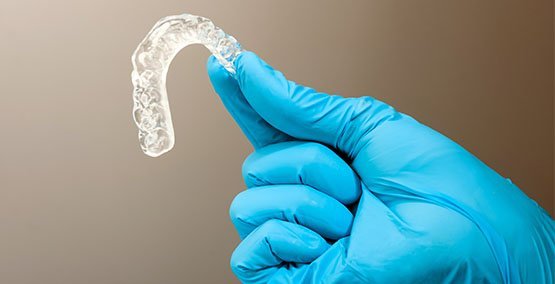Occlusal Splints
Occlusal Splints for Bruxism and TMD

Occlusal Splints Casula
Occlusal splints are removable appliances made to fit the upper or lower teeth to manage temporomandibular joint (TMJ) disorder and bruxism.
Your dentist at Casula Dental Care will properly fit an occlusal splint for you to keep your jaw muscles in a relaxed position and prevent teeth grinding and clenching.
Bruxism
Bruxism, or teeth grinding, is a common condition that affects both adults and children. It occurs when a person grinds their teeth or clenches their jaws, usually during sleep.
In most cases, the person is unaware that they are doing it until they are told that they do.
Although you may not hear the actual grinding of your teeth, there are many other signs and symptoms that you may notice, such as toothaches, morning headaches, earaches, and sore jaw muscles.
How Occlusal Splints Work
Occlusal splints cover the chewing surfaces of the upper teeth. It is made to be worn during sleep. They will not keep you from grinding or clenching.
However, they guide the jaw to a neutral position which relieves some of the pressure on the jaw joint and protect your teeth against the destructive forces of bruxism.
Your Occlusal Splint Appointment
When occlusal splints are made, two short appointments are usually required:
Initial appointment
During this appointment, your Casula dentist will take impressions and measurements of your upper and lower teeth.
Next appointment
At this point, your Casula dentist will make sure that your new splint fits comfortably around your upper teeth and in your bite.
Occlusal Splints in Casula
If not dealt with correctly, bruxism can loosen or crack your teeth and, in rare cases, cause tooth enamel erosion and eventually, loss. If ignored, this condition can also cause damage to the temporomandibular joints (TMJ) in your jaw.
Visit your Casula dentist today!
If you want to know more about occlusal splints in Casula, please call us on (02) 919 99695 or request your appointment online.
We are located at Shop 17A Casula Mall, 1 Ingham Drive in Casula.
FREQUENTLY ASKED QUESTIONS
What is an occlusal splint?
How do occlusal splints work?
What is clenching? Is it dangerous for my teeth?
Is further treatment required?
As such, your occlusal splint will wear down, chip, and may eventually break after series of grinding and chewing on it. When this occurs, your splint will need to be replaced.
In cases of severe bruxism, treatment by a physiotherapist may be necessary to treat any muscular discomfort and to provide exercises to strengthen and protect your jaw joint.
